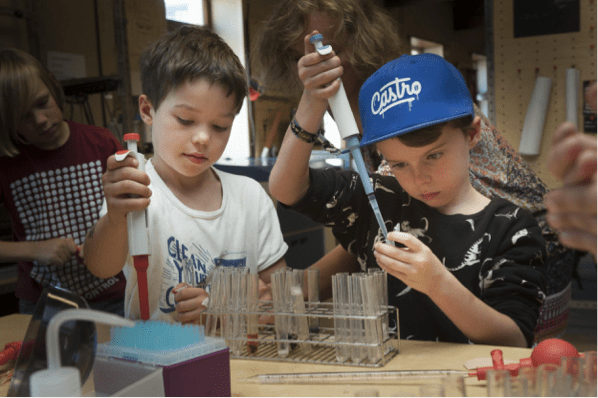The ways people are conducting bioscience are changing. Cheaper equipment has paved the way for citizens to perform increasingly advanced experiments. So-called citizen scientists have recently begun to organize themselves into communities in shared spaces. In Belgium, this has led to a series of innovations in the way science reaches society.
In a revolution similar to the rise of home electronics and computers, technological advancements now allow bioscientists to experiment cheaply, independent of professional labs. Bioscientists have seized such opportunities and have started organizing themselves into so-called Do-It-Yourself biology (DIYbio) labs all over the world. Here, they share resources and knowledge in order to be able to conduct increasingly advanced experiments. These experiments range from building their own equipment, such as a DIY version of a PCR machine or even microfluidics, to actual lab work, such as developing a glowing plant. The global DIYbio movement, which began in the United States, has been around for over a decade and is dedicated to making the biosciences accessible to everyone.
ReaGent, based in Ghent, is the first DIYbio lab in Flanders. This nonprofit was launched in 2015 when three friends came up with a solution to answer two needs: a place to experiment freely and a new, more effective way to explain biosciences to non-experts. The idea for the lab was born—a space filled with machinery for use in experiments—as well as an open, communicative approach that would be understood by people from any background.
Through donations of equipment and custom-built machinery, the lab is now well equipped for research ranging from the development of biomaterials to microbiology and DNA technologies. This allows people, whether designers, students, or biologists, to use the lab, further explore their interests, and broaden their horizons. The community often hosts specific events and workshops that draw a diverse audience interested in knowing more about science or engaging with it.
A place to experiment freely
Elise is a good example of the opportunities these spaces provide, she is an architect with an aversion to plastics and other unsustainable materials. Elise was fascinated by the potential of using microorganisms to form biodegradable building materials. One of the possibilities she wanted to research was a mycelium-based material consisting of woody agricultural waste glued together by the hyphae (filaments) of fungi. She was able to start her research in ReaGent, get help from the community, and make enough early progress to obtain funding by the Research Foundation – Flanders (FWO) in the labs of the VUB as a doctoral researcher. Currently, she’s researching the potential of the material in combination with digital manufacturing—think robot arms built with living materials.
In Paris, the DIYbio lab La Paillasse launched an open science challenge for solutions in cancer research. Meanwhile, a group of citizen scientists from Oakland crowdfunded the development of an open source protocol for insulin.
The potential innovative role of these DIYbio spaces is clear. They are hubs for creativity, push the boundaries of previous possibilities, and allow new types of interdisciplinary collaboration.
Motivate the little ones for science!
The ReaGent community was drawn to education right from the start. Over the years, they developed educational content, brought DIY science to fairs, and taught workshops to school children and underprivileged groups. The response was so overwhelmingly positive that they decided to launch another nonprofit, Ekoli, which is dedicated to bringing relevant bioscience education to underprivileged groups and school children.
The team of volunteers behind Ekoli develops educational content, trains teachers, provides groups of children with fun and practical workshops on biology, and initiates innovative projects in education, one of which will begin later this year. Together with several partners, Ekoli will evaluate the potential of installing open biolabs in schools, as schools often lack the budget to acquire lab equipment for modern experiments. They plan to salvage second-hand industrial lab equipment that would otherwise be wasted and use it to educate the scientists of tomorrow. If your research lab has spare equipment or consumables that are still functional, drop Ekoli an e-mail or watch for the call later this year.
What started in ReaGent as a place to talk science and tinker has become an accelerator for the impact of science on society.
This story demonstrates how change is slowly seeping through the scientific landscape. Trailblazers are experimenting all along the knowledge chain with innovations in science education, scientific research, and science communication. How is your company preparing for the future?
Header Image: One of the Ekoli workshops, by Yvon Poncelet
Bottom Image: The ReaGent lab, by Kim Verhaeghe, EOS Wetenschap
This article was written by guest columnist Winnie Poncelet.


